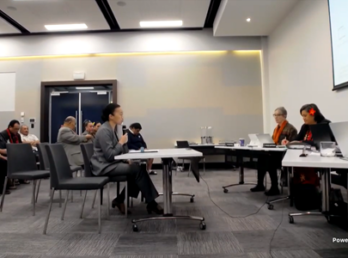The Shakeup of the AEWV Scheme and What It Means for Employers and Migrant Workers articles
Date
12 Apr 2024
Related Expertise
It was over 6-weeks ago that the Minister of Immigration announced that there would be immediate changes to the Accredited Employer Work Visa (AEWV). This was in response to the 80-page final report released by the Public Services Commission in late-February 2024 which found serious issues with the AEWV processes. Since then, there has been lots of speculation about which way they would go.
On Sunday 7th April 2024, the government announced a raft of new changes, a shakeup of the AEWV that will significantly impact employers and migrant workers. Changes affect employer accreditation, job check requirements and AEWV applications. This includes additional employer obligations and higher thresholds to show that they have tried to fill vacancies with New Zealanders; the reintroduction of ANZSCO; how long a migrant worker can spend working in New Zealand, minimum English language standard and a new minimum skill requirement.
We are well-positioned to provide advice and advocacy. Contact us for assistance and guidance with these new changes.

For Employers
1. New Minimum Skill Requirement
Currently, employers must check applicants meet the specifications that were listed by them in the Job Check application, as the minimum requirements for the job before a job token is sent.
The new changes stipulate that employers must now take reasonable steps to ensure that migrant workers are suitably qualified and meet a minimum skills and experience threshold before offering the job.
Unless the role is on the Green List and meets the list requirements, or is paid at least twice the median wage, applicants must meet the minimum skills and experience threshold:
- At least 3 years’ relevant work experience, or
- A relevant qualification at level 4 (or above) on the New Zealand Qualifications and Credential Framework.
“Reasonable steps” require the employer to sight independent evidence of work experience, or qualifications. Alternatively, the employer may require the applicant to undergo a practical test or demonstrate their knowledge through a job interview.
It would be prudent for employers to document its “reasonable steps” and allow additional time to ensure this new requirement is completed. Exactly how Immigration New Zealand intends to ensure employer compliance is unclear but will soon see how this requirement will be assessed in new the AEWV applications.
These requirements must be met for all Job Check applications. Employers who are accredited or re-accredited from 7th April 2024 will need to take reasonable steps to enquire migrant workers meet skill requirements as part of their accreditation obligations.
Contact us if you are an employer and have questions about how this new requirement will affect you.
2. Now Using ANZSCO Skill Levels and “Substantial Match Assessment”
Occupations for AEWV work visas will now be closely assessed against a classification of occupations called “ANZSCO” (Australian New Zealand Standard Classification of Occupations).
ANZSCO skill levels 1, 2 and 3 jobs are normally management, professional, technical or trade roles (such as doctors, chief executives or carpenters). ANZSCO skill levels 4 and 5 jobs are usually Community or Personal Service workers or Clerical, Administrative workers.
It was implied that ANZSCO skill levels 1, 2 and 3 jobs would be largely unaffected by the changes compared to ANZSCO skill levels 4 and 5 jobs that have been the focus of the new changes.
Immigration New Zealand will determine whether the role is ‘substantially consistent’ with the ANZSCO occupation and may undertake a ‘substantial match assessment’ where the tasks listed must comprise most of the proposed role.
The ANZSCO ‘substantial match assessment’ has been a contentious topic over the past years arising from inconsistent and poor decision-making by Immigration New Zealand. This matter has been addressed by the Immigration and Protection Tribunal who has consistently stated that the substantial match enquiry is not a tick box exercise but a question of fact and degree in the context of the applicant’s employment.
Immigration New Zealand will need to be reminded it must undertake a holistic assessment of the actual tasks undertaken by the applicant, the nature of their employment and the context in which the employment takes place. With the introduction of the ANZSCO assessment, can we expect another wave of inconsistent decisions from Immigration New Zealand?
Diana Bell has extensive experience resolving challenging cases that have involved issues with ANZSCO assessments. Contact us to discuss further.
3. Labour Market Test for ANZSCO Skill Levels 4 and 5 Occupations
Currently, accredited employers need to advertise the job nationally for at least 14-days as part of their Job Check unless the job pays at least twice the February 2023 median wage ($29.66 per hour) or if the role is on the Green List and requirements on the list are met.
The new changes will now require employers to lodge the vacancies with Work and Income for ANZSCO Skill Levels 4 and 5 jobs plus advertise the job nationally for at least 21-days. They will need to satisfy Immigration New Zealand that there are no New Zealand candidates that are suitable or available.
Consultation with Work and Income is a return to the former rules, which was done away with during Covid-19. In the past, Work and Income rarely reported there were suitable New Zealand candidates, and producing Skills Match Reports were proven to be a burden and time consuming.
This process will see Work and Income respond within 5-working days if the job will be listed or not. At the end of the listing period (up to 21-days), Work and Income will issue an Engagement Check that will need to be submitted with the Job Check application.
These new changes and additional requirements will require employers to plan accordingly.
Contact us if you are an employer and want to know more how this new requirement may impact you.
4. Employer Obligations
- From 7th April 2024, new AEWVs will be issued with a condition requiring employers to employ migrants for at least 30 hours per week. Failing to do so, Immigration New Zealand will revoke accreditation.
- Accredited employers must now notify Immigration New Zealand within 10 working days if an AEWV holder’s employment ends.
- From 11th April 2024, Immigration New Zealand will start issuing infringement notices in its latest move to crack down on non-compliant employers.
Infringement notices will be handed to employers who will be found:
- Employing people in breach of their visa conditions
- Employing a person unlawfully in New Zealand
- Failing to comply with a 10-day information request
Infringement penalties can include:
- A minimum fine of $1,000
- Loss of accredited employer or Recognised Seasonal Employer Status
- Being banned or stood down from supporting further visas for migrant workers
This could last for six months for a single infringement notice, with an extra six-month stand-down for each subsequent infringement notice.
A 12-month maximum stand-down period await employers who are issued multiple infringement notices at once, while those with more serious breaches may result in criminal charges.
Contact us if you are an employer and wish to know more how these new obligations may affect you.

For AEWV Holders
1. Maximum Time Working in New Zealand
A migrant worker can spend up to 5-years working in New Zealand provided they are paid at the February 2023 median wage ($29.66 per hour) and
- Work in an ANZSCO skill level 1, 2 or 3 job; or
- Work in job on the Green List; or
- Work in job included in the Transport Sector Work to Residence list; or
- Paid at or above 1.5 times the median wage; or
- The AEWV was granted on or before 6th April 2024.
AEWV on or after 7th April 2024
For ANZSCO skill levels 4 and 5 jobs paying at or above the required AEWV wage rate, the maximum visa length for an AEWV is reduced to 2 years, with the ability to apply for one more year with a new Job Check.
The total time workers can stay in New Zealand on one or more AEWVs is reduced to 3 years, after which time workers will need to leave New Zealand, normally for 12-months before applying for another AEWV.
These changes apply to anyone who applied for their first AEWV on or after 7th April 2024 or before 21st June 2023.
Many migrant workers will have to leave New Zealand from 2025 onwards when AEWVs first issued in 2022 onwards start to expire. It would be prudent to explore now what options you have and next steps to take. Contact us if you wish to discuss your options.
The length of an AEWV and maximum continuous stay for people in ANZSCO skill levels 1, 2 and 3 jobs will remain 5 years.
2. Minimum Standard of English
From 7th April 2024, people applying for AEWVs to work in ANZSCO skill level 4 or 5 jobs must now prove they meet an English language standard. This requirement will not apply to current applications, or to people travelling as a partner or child of an AEWV applicant.
The English language requirements can be met through:
- The applicant’s citizenship, where they studied and the qualifications gained
- English language tests
Citizens of Canada, the Republic of Ireland, the UK or USA who have worked or studied for 5 years or more in one of these 4 countries (or Australia or New Zealand) will not need to sit an English test. Likewise, a qualification at Level 7 (requiring 2 or more years of study) or a Level 8 qualification (requiring 1 year or more of study) completed in Australia, Canada, New Zealand, the Republic of Ireland, the UK or USA will not require an English test.
For everyone else they will need to sit and pass an English test. There are several tests that are acceptable for an AEWV but the most commonly one known is the International English Language Testing System (IELTS) with an overall score of 4 or more to reach the standard of English required.
Here in New Zealand, we have traditionally only ever asked for English tests at the residence stage. This will be the first time English language is a requirement for a temporary work visa. Since Covid-19, however, we have seen a situation where the number of workers in ANZSCO skill levels 4 and 5 jobs has grown considerably, and the concern is the link between those being exploited and lack of English.
3. Changes to Skilled Residence Pathways
The recent raft of changes has also made a significant impact on skilled residence pathways.
4. Transport Sector
Certain occupations in the Transport Sector Work to Residence no longer have a pathway to residence. These include bus and truck drivers who apply for a AEWV on or after 7th April 2024 as the shortages of drivers reported when this was established is said to have been filled. Other affected occupations include:
- Aircraft Refueller
- Furniture Removalist
- Tanker Driver
- Tow Truck Driver
The only two occupations remaining on Transport Sector Work to Residence are Ship’s Master and Deck Hand.
5. Cancelled Occupations Not Included in Construction and Infrastructure Sector Agreement
The decision by the former government to include 7 new roles into this Agreement will not progress. This means work visas cannot be secured for people wanting to work in these roles when the pay rate is below the median wage. Affected occupations are:
- Driller’s Assistant
- Earthmoving Labourer
- Earthmoving Plant Operator general
- Linemarker
- Machine Operators not elsewhere classified
- Mechanic’s Assistant
- Road Traffic Controller
6. New occupations Added to the Green List
From 8th April 2024, 6 new roles will be added to the Green List:
Straight to Residence (can apply immediately for residence subject to meeting certain requirements)
- Aviation Engineer (Avionics, Aeronautical, Aerospace Engineer)
- Naval Architect (aka Marine Designer)
- ICT Database and Systems Administrator
- Mechanical Engineering Technician
- Aircraft Maintenance Engineer
From May 2024, secondary school teachers move to the Straight to Residence pathway. The move is to help fill the likely shortage of secondary school teachers in the short to medium term. Other teachers remain on the Work to Residence pathway.
Work to Residence (can apply for residence after 24 months of employment in New Zealand subject to meeting certain requirements)
- Corrections Officer
7. Cancelled Occupations Not Included on Green List
The government has cancelled the decision by the former government to add the following 11 occupations onto the Green List. Affected occupations are:
- Paving Plant Operator
- Metal Fabricator
- Pressure Welder
- Welder
- Fitter (General)
- Fitter and Turner
- Fitter-Welder
- Metal Machinist (First Class)
- Panel Beater
- Vehicle Painter
- Road Roller Operator
The decision will be devastating for both those in New Zealand on work visas in these occupations, and employers who rely on these workers. Contact us to discuss other residence options that may apply.
There is no doubt there will be aspects of the recent shakeup will leave employers and workers with more questions and uncertainty. Contact us if you have questions about how these changes will impact you, what options are available and next steps to take.
Subscribe
Get insights sent direct to your email.

































